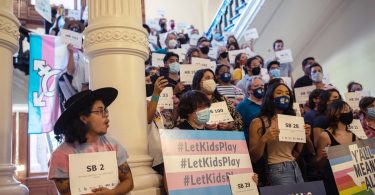Trans legislation and the youth mental health crisis Since 2018, 19 states have enacted a total of 48 laws restricting transgender rights, ranging from bans on gender-affirming care to limitations on bathroom access and participation in school sports. ( Lisa5201/Getty Images)
In a stark warning to lawmakers and policymakers, a new study published in Nature Human Behaviour has revealed a troubling connection between anti-transgender legislation and a dramatic increase in suicide attempts among transgender and nonbinary (TGNB) youth in the United States.
The research, conducted over four years, found that states enacting anti-trans laws saw suicide attempt rates increase by up to 72% among TGNB youth aged 13 to 17. The study analyzed data from over 61,000 TGNB individuals across all 50 states, providing the most comprehensive evidence to date of the impact of these laws.
“From 2018 to 2022, 48 anti-transgender laws (that is, laws that restrict the rights of transgender and non-binary people) were enacted in the USA across 19 different state governments,” the study reports. These laws primarily targeted gender-affirming care, bathroom access, and school policies.
The research team used a difference-in-differences approach, comparing suicide attempt rates before and after the implementation of anti-trans laws, while controlling for various factors including state-by-state differences, race, age, and even the impact of COVID-19.
“We found minimal evidence of an anticipatory effect in the time periods leading up to the enactment of the laws. However, starting in the first year after anti-transgender laws were enacted, there were statistically significant increases in rates of past-year suicide attempts among TGNB young people ages 13–17 in states that enacted anti-transgender laws, relative to states that did not,” the authors state in the paper.
The study’s findings come at a time when debates over transgender rights have intensified in state legislatures across the country. Since 2018, 19 states have enacted a total of 48 laws restricting transgender rights, ranging from bans on gender-affirming care to limitations on bathroom access and participation in school sports.
Jaymes Black, CEO of The Trevor Project, emphasized the real-world impact of these policies in a press release: “It is without question that anti-transgender policies, and the dangerous rhetoric surrounding them, take a measurable toll on the health and safety of transgender and nonbinary young people all across the country.”
The study adds to a growing body of research showing that gender-affirming care saves lives, while bans on such care, along with forced outing policies in schools and bathroom restrictions, have significant negative impacts on TGNB youth in affected states.
As the 2024 election season approaches, the study’s authors hope their findings will influence both voters and policymakers. “Our findings highlight the need to consider the mental health impact of recent anti-transgender laws and to advance protective policies,” they conclude in the paper.
With several states considering additional anti-trans legislation, and others moving to protect TGNB rights, the debate is far from over. But this study has undoubtedly raised the stakes, putting a spotlight on the very real and potentially deadly consequences of these political decisions.
The research team emphasizes the critical nature of their results, pointing out that the implementation of anti-transgender legislation at the state level was associated with a significant uptick in suicide attempts among TGNB youth over the past year. The increase ranged from 7% to a staggering 72%. Based on these findings, the researchers underscore the urgent need to evaluate the mental health consequences of recent anti-transgender laws and advocate for the development and implementation of policies that protect TGNB individuals.
“We’re talking about real young people’s lives,” said study co-author Dr. Ronita Nath, vice president of research at the Trevor Project. “Trans people are family members, our friends, our neighbors, and they deserve a lot better than this.”







